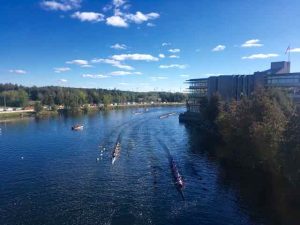“We don’t hope for miracles. We make miracles a reality by doing more than we ever thought possible”.
This sentiment was instilled in me by my rowing coaches in the summer of 2012. I had set a goal to win the Royal Canadian Henley Regatta and, with the help of my coaches and teammates, my goal was turned into a reality. The phrase above was the best way my team could express how we felt about our achievement.

Being a member of Cohort 21 gives me a similar feeling.
I am presented with new opportunity to tackle big goals. Challenges, even those that seem insurmountable, quickly become opportunities.
Like in rowing, what we’ll achieve through Cohort 21 will not happen overnight and it will not happen in isolation. It will take a team of passionate, thoughtful, and energetic people all working towards their own goals. It will also take the individual to show up, be willing to take risks, and to push outside of what is comfortable. Added to all this is an undeniable persistence to do and be better, which usually happens around 5:00 am. Reaching our goals, through Cohort 21, requires the same persistence, give or take an hour, and maybe after a coffee.
I’m starting this year of Cohort with my mind on a couple challenges. I may explore students’ relationship with reading and expand the culture of reading at TCS. It may be the time to push myself from being a passive observer of the “Teachers Throwing Out Grades” facebook group and begin to engage in the idea of going gradeless, which I have been intrigued by since my Bachelor of Education. Both have, “Oh man! If you could do that it’d be a miracle,” qualities to them — so they are most definitely worthy of further consideration. I look forward to seeing where they take me.
As we move quickly towards our first F2F, I wonder, what is the challenge in your practice that, if solved, would be a miracle?
@nbendle Super intro post to help our newest cohort wrap their head around the C21 process. Thanks!
Thanks @jmedved!
I really like this quote! And it has got me thinking about addressing your closing question as I gear up to write my first blog for Cohort21 (and ever! bites nails frantically). There are so many things that I find swimming around my head …….give or take a coffee or two!
@Tfaucher I can’t wait to hear what your ideas are! I haven’t decided either yet — Just getting the ideas out there is a big first step! Looking forward to meeting you on Saturday.
This post sets us up nicely to not only know more about you, but also to know more about your thinking and direction. One thing to consider is sharing WHO are the influencers for you in these two areas of building a culture of reading (check out @gvogt and @brenthurley and @shelleythomas for starters) and rethinking grades and feedback (check out @danielleganley and @vkraus and @edaigle for a start!). By following and engaging them and their work, it might help you choose your path.
And as a fellow (albeit recovering) rower, I think your comments about having patience, putting in the hard work, totally hit the mark!
Thanks,
garth.
So great! Thanks @gnichols!
I’ll take a walk over to Hurley’s office now… 🙂
Hi Nichola,
I’m really focusing my year around building a culture of readers. I had an epiphany a while back around what we want from our students in terms of reading and the explicit reading skills we teach (or don’t). This “aha” moment came from reading the work of Kelly Gallagher (mostly Readicide) and Kylee Beer’s “Disruptive Thinking”. Have you read either? It was a game changer which led to some pretty profound shifts in this old lady’s (22 years of teaching….I’m an old dog.) thinking about reading. I’d love to chat more with you. Say hi to my pal, Hurley. He’s my cohort 21 husband. Thanks for @gnichols for the shoutout. I’m always looking to connect with teachers.
With gratitude,
Danielle
@dganley! I have been meaning to get back to you since the moment I read this! I have read Kelly Gallagher’s Readicide, but not Kylee Beer’s work. I will check that out! I also follow a lot of Penny Kittle’s work (I bet you do too!). I would love to chat more with you about reading and will most definitely say Hi to @bhurley for you.
Speak soon 🙂